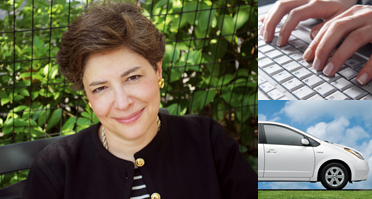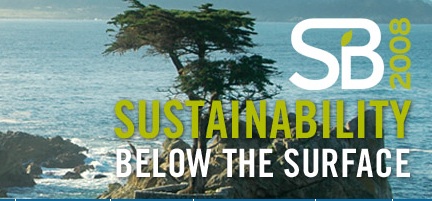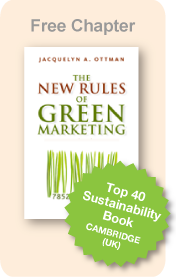Jacquie Ottman's
Green marketing Blog

Is There a Green-Consumption Gap?
Posted on October 14, 2008 by Jacquelyn Ottman
A new poll shows that 76% of consumers say they want to help others and 69% aim to provide a better life for their children, but only 26% say they actively seek out environmentally responsible products - a challenge for sure for green marketing. Paradoxically, more than 90% say that the environment influences their day-to-day purchasing decisions. What's going on?
If the environment is truly influencing as many as 90% of consumer purchasing decisions, chances are respondents are either overreporting to a surveytaker in the interest of looking worthy …Read more...
Play Ball with a Polluter—or Not?
Posted on September 04, 2008 by Jacquelyn Ottman
ExxonMobil is coming around to the fact that a green reputation is necessary to compete. Among other steps, they are investing in their R3M technology to remotely detect oil and gas and reduce drilling. From a marketing perspective, they are running an extensive campaign in major dailies and newsweeklies, and among other things, are sponsoring the Washington Nationals’ LEED-certified baseball park.
But not everyone is so comfortable with Exxon’s green marketing efforts. Sponsorship of the baseball park is drawing flack from environmental activists, who are pressing the Nationals to …Read more...
Déjà Vu All Over Again - Part II
Posted on July 22, 2008 by Jacquelyn Ottman
Last month I discussed some of the green marketing missteps that we keep repeating no matter how many times we should have learned from hard experience that such tactics fall short. I suggested that rather than repeating these mistakes, perhaps the best solution is to move forward with new product innovations that truly transcend green marketing claims and eco-labels.
In fact, pursuing a course of eco-innovation - new product concepts with the potential for significantly enhanced consumer benefits and significantly reduced environmental impact - might be just what the …Read more...
How Far, Pray Tell?
Posted on July 22, 2008 by Jacquelyn Ottman
How far have your products traveled from manufacturing plant or farmer's field to market? Perhaps it's time to tell your consumer. In a marketplace where more and more consumers want to know their carbon footprint, and the marketers themselves are often confused about how to craft their sustainability messages, meaningful, easy-to-understand information is at a premium. Too many think, for instance, that bamboo (which travels 6,000 miles to get to your floor) and fair trade bananas are going to "save the planet," when the truth is that locally procured alternatives …Read more...
It Isn’t Always So “Friendly” Being Green
Posted on July 22, 2008 by Jacquelyn Ottman
Don’t join the growing number of marketers throwing around phrases like "environmentally friendly,” “Earth friendly," and "ozone friendly." While such claims have a calming ring, they can be very misleading. The simple fact is, there is no such thing as an "eco-friendly" product; all use resources and create waste to some degree. To avoid such confusion in the marketplace, the Federal Trade Commission introduced its Environmental Marketing Guidelines in 1992. Some key takeaways:
—Be specific. Marketers are liable not only for inaccurate statements but also for consumers' misinterpretations of …Read more...
Make It Your Own
Posted on July 22, 2008 by Jacquelyn Ottman
Look around at the all green campaigns today and you'll see a focus on personal involvement, coupled with a glut of environmental advice such as purchasing CFLs. However, amidst all the clutter, the question arises: How can you differentiate your communications in a marketplace crowded with green advertising? The answer lies not in screaming for more energy efficient products, but by articulating your niche. Consumer empowerment marketing angles have merit, but the most powerful green messaging derives from core business functions. Bland claims of "win-win" situations, of "how to do …Read more...
Move Over Kermit - Employees Are Taking the Eco-Spotlight
Posted on July 22, 2008 by Jacquelyn Ottman
To help spread the word about their new sustainability campaigns, leading companies including Coke, Anheuser Busch, and Ford are starting to leverage one of their most powerful assets: their employees.
Using employees to promote sustainable initiatives is a winning strategy. Why? Employees are “regular people” and, as such, they are much better equipped to gain more trust and confidence of prospective consumers than splashy Hollywood celebrities, million dollar CEOs, and paid pitchmen. Employees are objective critics of their companies' greenness. If employees are viewed as involved and openly on-board …Read more...
Before They Buy, Consumers Have to “Buy It”
Posted on July 22, 2008 by Jacquelyn Ottman
Back in December 2004, HSBC became the first major bank to commit to carbon neutrality, aiming to improve energy efficiency, buy "green electricity," and then offset the remaining carbon dioxide emissions using carbon "allowance" or "credits." As a global bank with numerous offices and branches gobbling up significant amounts of fossil fuel-generated energy, HSBC made a smart strategic move by committing to carbon management. And the scope of that commitment, paired with the strong business case for action, gave HSBC the credibility it needed to deliver an effective sustainability-focused marketing …Read more...
Controlling Interest
Posted on July 22, 2008 by Jacquelyn Ottman
Consumers' desire to control a world that's increasingly viewed as spinning out of control lies at the heart of green marketing. If they didn't feel that greener products made a difference, there would be no market for organic produce, non-toxic cleaners, or Energy Star-qualified appliances.

Getting Your Consumer to 'Bite': Green Marketing Strategies
Empower your consumers with messages that underscore the difference they make as one consumer or in concert with all the other …Read more...
Green, No…Greener, Maybe
Posted on July 22, 2008 by Jacquelyn Ottman
You'd never know it reading the press kits, but there's actually no such thing as a green product. All products use resources and create waste to some extent. At best, there are "greener" products that have less environmental impact than others. If you're mindful of a potential green backlash (and you should be!), develop your sustainability message with this in mind.
Are you reading this, Mercedes-Benz? I hope so. That "clean-air blue" motif is cutting it a bit fine. I read somewhere that Toyota's ad agency once presented them …Read more...
Sustainable Branding in the 21st Century
Posted on June 05, 2008 by Jacquelyn Ottman

Just got back from the Sustainable Brands 08 Conference, in Monterey, California. Over 550 people gathered to hear about the latest trends, see the leaders in sustainability speak, and learn about new tools to conduct their business in a better way.
I had the honor of keynoting the conference. Several of the points I made were iterated by many of the speakers and by participants via their insightful questions from the floor. So there's a lot of consensus out there about what …Read more...
Ottman at Sustainable Brands ‘08
Posted on June 03, 2008 by assistant

Jacquelyn Ottman and many other sustainability experts gathered in beautiful Monterey California for Sustainable Brands '08. The conference, presented by Sustainable Life Media, is the brand event of the year and has drawn top sustainability experts from across the globe.
On Monday, June 2, Jacquelyn Ottman conducted an exciting and thought provoking workshop on green marketing entitled: Green Marketing 101: There's No Such Thing as a Green Product. …Read more...
Why I’m Tired of Hearing About Green Fatigue
Posted on May 29, 2008 by Jacquelyn Ottman
"Green Fatigue." It's a term that's come out of the U.K. recently to describe consumers and designers who are so overwhelmed with "in your face" green marketing pitches that they have "gone back" to tried and true products and messages focused on performance and quality. I find the term preposterous! The lone U.K. journalist who coined it in the fall of 2007 may have had his own ears so tweaked to green, he may be personally fatigued, but the average consumer is just getting going. Most green-product categories only have …Read more...
Consumers Want Better Products, Not Processes
Posted on May 29, 2008 by Jacquelyn Ottman
Many companies tout their green processes as they lobby for consumer recognition as a green company. but it would be far more productive to spotlight products instead.
Michael Mendenhall, CMO of HP, demonstrated his understanding of this when, in a recent Ad Age interview, he stated that purchasing carbon credits are not enough to qualify a company as green—that products, like his company's own Dynamic Smart Cooling System, was a "key plank" in any corporate sustainability platform.
Campaigns susch as BP's Beyond Petroleum and GE's …Read more...
What Green Marketers Can Learn from Prius’ Success
Posted on March 30, 2008 by Jacquelyn Ottman
Hardly a week goes by without Toyota’s Prius making green marketing headlines. Let's take a step back and analyze why this product has been so wildly successful, attracting a broad swath of consumers — and not just deep-green ones — like a powerful magnet, all the while creating a new definition of automotive cool. By Jacquelyn Ottman
Let’s start with the car itself. Its distinctive styling and unique silhouette acted as a moving billboard for the new technology. Inside, passengers get all the creature comforts they expect from pricier vehicles …Read more...

